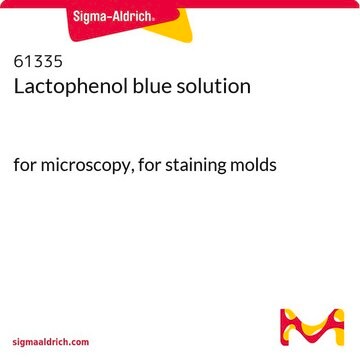18909
Calcofluor White Stain
suitable for microbiology
About This Item
Productos recomendados
product line
BioChemika
Quality Level
form
liquid
composition
Calcofluor White M2R, 1 g/L
Evans blue, 0.5 g/L
technique(s)
microbe id | staining: suitable
color
blue to very dark blue
λmax
423-443 nm
fluorescence
λex 423-443 nm in 0.1 M phosphate pH 7.0
application(s)
food and beverages
hematology
histology
microbiology
storage temp.
room temp
suitability
fungi
parasites
yeasts
SMILES string
C1=CC=C(C=C1)NC2=NC(=NC(=N2)N(CCO)CCO)NC3=CC(=C(C=C3)C=CC4=C(C=C(C=C4)NC5=NC(=NC(=N5)NC6=CC=CC=C6)N(CCO)CCO)S(=O)(=O)O)S(=O)(=O)O
InChI
InChI=1S/C40H44N12O10S2/c53-21-17-51(18-22-54)39-47-35(41-29-7-3-1-4-8-29)45-37(49-39)43-31-15-13-27(33(25-31)63(57,58)59)11-12-28-14-16-32(26-34(28)64(60,61)62)44-38-46-36(42-30-9-5-2-6-10-30)48-40(50-38)52(19-23-55)20-24-56/h1-16,25-26,53-56H,17-24H2,(H,57,58,59)(H,60,61,62)(H2,41,43,45,47,49)(H2,42,44,46,48,50)/b12-11+
InChI key
CNGYZEMWVAWWOB-VAWYXSNFSA-N
General description
Application
signalword
Danger
hcodes
Hazard Classifications
Carc. 1B - Eye Irrit. 2
Storage Class
6.1C - Combustible acute toxic Cat.3 / toxic compounds or compounds which causing chronic effects
wgk_germany
WGK 3
flash_point_f
Not applicable
flash_point_c
Not applicable
ppe
Eyeshields, Gloves, type P3 (EN 143) respirator cartridges
Elija entre una de las versiones más recientes:
¿Ya tiene este producto?
Encuentre la documentación para los productos que ha comprado recientemente en la Biblioteca de documentos.
Los clientes también vieron
Nuestro equipo de científicos tiene experiencia en todas las áreas de investigación: Ciencias de la vida, Ciencia de los materiales, Síntesis química, Cromatografía, Analítica y muchas otras.
Póngase en contacto con el Servicio técnico











